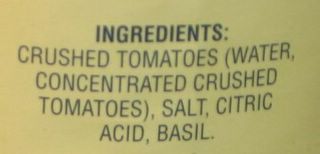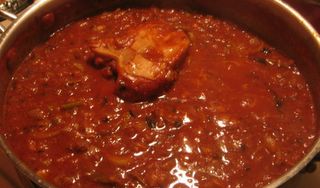And there's nothing inherently superior about simple food compared to complex. The tendency to assume the simpler is better and purer comes from deep in the American Protestant psyche. Shaker barns are beautiful, but neither more beautiful nor more moral than a Gothic cathedral, and I would say the same applies to food. A simple poached pear is not better than a Napoleon, and a salad of mixed greens is not better than a curry. There are just different. And it is true that less-than-wonderful ingredients can be used more effectively in more complicated cooking, which means it's worth learning how to cook well if you want to eat delicious food without paying bundles.
But (and y'all knew that "but" was coming, didn't you?), the basic ingredients of an American supermarket are crap. Really. Particularly the meat and vegetables and dairy. (You can do okay on some staples like pasta and vinegar and so on.) And Julie's beloved Julia Child, who was no food snob, knew this. That's why you can watch her swoon in the markets of Provence in the old episodes of the French Chef that have just come out in DVD.
So here's my story about good ingredients, bad ingredients, and the ability of one to save the other.
Last Sunday was raining and dreary and miserable in Boston. I had spent the day before with my boyfriend at the Lowell Celebrates Kerouac festival, which involved a lot of walking from one place to another in the rain and getting drenched. So Sunday I just wanted to stay inside and warm, with something cooking slow and low. I decided that the ideal comfort food for the day would be pasta with a red sauce, but I was out of canned tomatoes. I couldn't bear the rainy trip to the supermarket, but there's a packie down the corner, and I ran down to buy a can of tomatoes.
I was pleased that there were two choices of crushed tomatoes available, Hunt's and another brand with an Italian-looking label. I bought the Italian-looking one. I didn't read the label.
Back home, I started my sauce by slowly cooking some onions. Then I cut the meat off the shank I had thawed and diced the pieces. Browned the meat, added the onions back to the pot, added the nice marrowy bone from the shank, and then opened the can of tomatoes.
It's hard to describe the texture of these tomatoes. They were more like some sort of thickened tomato juice than crushed tomatoes, but lacking all pulp. I would say they had an unnatural thickness. What the hell did I buy? This:

New World Style?

What does that mean?


Oh. It means crappy.
Well, I was stuck. I poured in the tomato sauce, then added some beef stock. But I knew there was no way I was going to continue with my plan for the sauce, which was to just add a bit of cream after the long cooking. That would make the flavor far too dependent on the tomatoes, tomatoes that are probably usually used to make school lunch pizza.
So I started adding stuff. A bunch of fennel, chopped and quickly sauteed in another pan. A little carrot juice. A handful of wild dried mushrooms, re-hydrated and chopped. A bit of tomato paste. A goodly dose of good olive oil. Then I just let it cook for a long time.

The sauce cooks.

It was delicious. Really, very good. It was a great sauce, with low acidity, great depth and richness, meaty but with some high notes from the fennel.
Now, Julie would say that this proves her point, a good meal can be made from terrible tomatoes-from-concentrate. And she would be right. But I would also say that this proves that having on hand homemade beef stock, grass-fed organic beef, dried wild mushrooms, very fresh organic fennel and good quality tomato paste and olive oil will allow you to flub one ingredient - because the quality of the rest of the ingredients will raise the quality of the meal.
[Note: I love Julie; I just had issues with that particular article. But how could I not love her? In her blog, I read about someone who hates her job, loves Buffy, listens to the Magnetic Fields, drinks cocktails with abandon, and attempts absurdly complicated cooking tasks that end up being eaten around midnight. In other words, she's just like me. Except that she now has a gig at the New York Times and a newly published book. But otherwise, identical.]

No comments:
Post a Comment